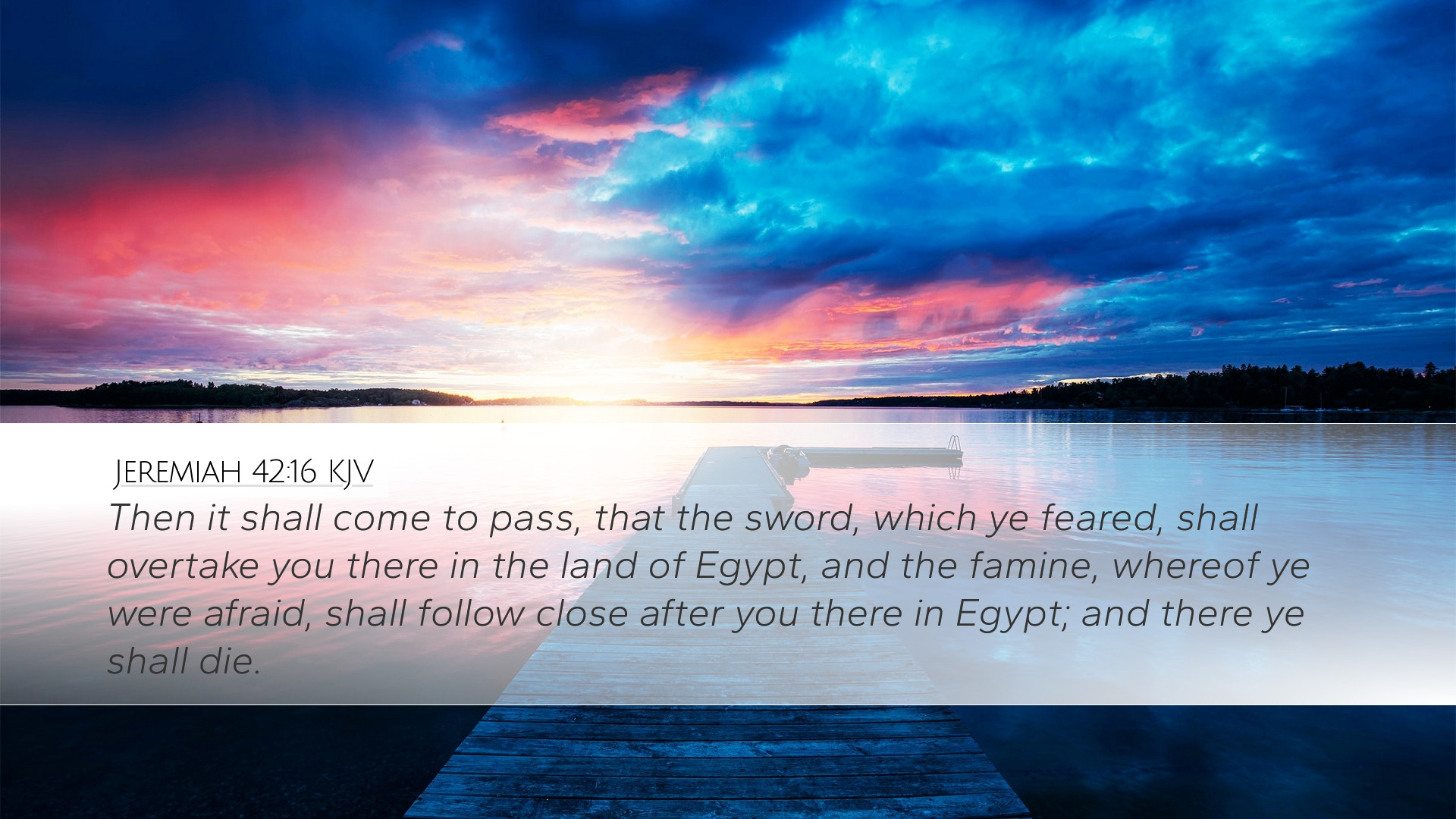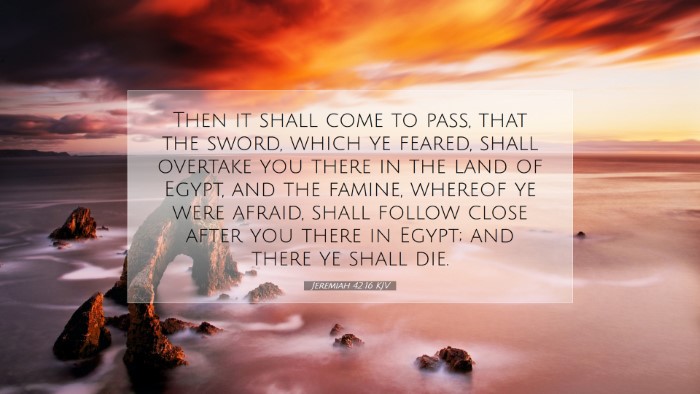Bible Commentary on Jeremiah 42:16
Verse: "Then it shall come to pass, that the sword, which ye feared, shall overtake you there in the land of Egypt; and the famine, whereof ye were afraid, shall follow close after you there in Egypt; and there ye shall die."
Introduction
The book of Jeremiah serves as a profound record of the prophet’s messages to a rebellious Israel, marked by themes of judgment, mercy, and restoration. In Chapter 42, the remnant of Judah seeks guidance from the Lord through Jeremiah after Jerusalem's destruction. Jeremiah 42:16 encapsulates a poignant warning to these people—a significant reflection on fear, divine judgment, and the repercussions of disobedience.
Contextual Understanding
In understanding Jeremiah 42, it is crucial to consider the surrounding context. The people of Judah, after the fall of Jerusalem to Babylon, were in a state of desperation. They sought refuge in Egypt, motivated by fear of the Chaldeans. However, this decision was fraught with rebellion against God’s directives, as He had instructed them to remain in their land.
The Call for Divine Guidance
The people approach Jeremiah with a plea for intercession, promising obedience to whatever word God might deliver. This sets the stage for the heavy prophetic pronouncement that follows, demonstrating the tension between human desire for security and God's counsel.
Exegesis of the Verse
The Sword and the Famine
Jeremiah 42:16 addresses the fears of the people: the sword and famine. The sword represents violence and death—a likely outcome if they remained in Judah. The famine symbolizes scarcity and desperation, reflecting their worst fears. Yet God speaks through Jeremiah, indicating that their escape to Egypt would not deliver them but rather fulfill their fears.
Divine Justice and Providence
This passage illustrates a critical theological point: God's justice is inextricably linked with His providential care. The Israelites sought refuge in Egypt, a decision marked by distrust in God’s promise to protect them. Thus, God signals that fleeing only brings them closer to the consequences of their sin.
Theological Reflections
Fear and Its Consequences
As captured by Matthew Henry, fear can lead to irrational decisions, driving individuals away from God’s intended path. The remnant’s fear of the Chaldeans led them to Egypt, ironically placing them in the grip of their foreboding. Barnes emphasizes that turning to worldly solutions often carries the seed of one’s destruction, as one cannot escape God's sovereign will.
Obedience and Judgment
In the prophet's declaration, Adam Clarke highlights the contrast between obedience and judgment. The remnants’ promise of obedience was nullified by their actions. God’s judgment was not simply a punitive response but a natural outworking of their disobedience. True obedience, as modeled through the scriptures, aligns with God’s will—even when it challenges human understanding.
Practical Applications for Today
Trust in Divine Guidance
For contemporary believers—pastors, theologians, and scholars—this passage serves as a sober reminder of the importance of seeking God’s guidance and trusting His plans over societal solutions. The narrative illustrates that actions motivated by fear rather than faith lead to disastrous outcomes.
Facing Fear with Faith
The remnant’s plight highlights the necessity of confronting fear with faith. This principle is vital for pastoral care, education, and spiritual leadership. Believers are called to respond to the uncertainties of life not by turning towards the world but by resting in the promises of God.
Understanding the Nature of God’s Justice
This passage compels theological reflection on the nature of God’s justice—both punitive and redemptive. God’s intent is not merely to punish but to restore His people. Pastors and theologians may draw on this text to teach congregations about the balance of fear, faith, obedience, and the complex nature of divine justice.
Conclusion
Jeremiah 42:16 stands as a solemn testament to the weight of seeking human security at the expense of divine direction. It reminds the church of the need for discernment in facing fears, the consequences of disobedience, and the character of God who desires to guide His children faithfully. Acknowledging fear, turning towards God in obedience, and understanding His nature not only brings clarity to individual lives but also builds a robust theological framework for community faith.


